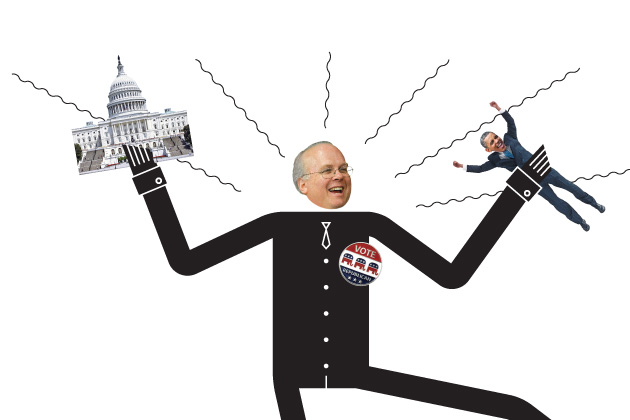 The latest cover story in Bloomberg Businessweek features former Bush adviser Karl Rove‘s assessment of current federal campaign spending rules:
The latest cover story in Bloomberg Businessweek features former Bush adviser Karl Rove‘s assessment of current federal campaign spending rules:
Rove’s return to the arena coincided with a major campaign-finance ruling by the Supreme Court. It irritates Rove that Obama has succeeded in crafting the conventional wisdom on Citizens United. According to Obama’s account, a 5-4 conservative judicial pronouncement liberated a cabal of zillionaires and corporations to launch a hostile takeover of American politics. In his State of the Union Address in January 2010, the president blamed the justices, some of whom were seated before him, for empowering “America’s most powerful interests, or worse … foreign entities” to “bankroll” elections. Television cameras caught Justice Samuel Alito mouthing the words, “Not true.”
Rove agrees with Alito. Obama’s bit about “foreign entities” giving to campaigns was flat wrong; that remains illegal. Citizens United did clarify that corporations have a First Amendment right to political speech in the form of spending for advocacy. The majority tossed out an important 1990 precedent and invalidated certain legislative restrictions on how and when companies and unions can deploy political dollars. Spending has increased dramatically in the wake of Citizens United, much to the advantage of Republicans, and yet the notion that the ruling sparked a brand new conservative bonanza is misleading. “The left,” Rove notes, “pioneered the use of 527s and 501(c)(4)s years ago, spending millions of dollars to influence public opinion and the policy landscape, on issues spanning the environment to the Iraq War. Drawing on their example, Crossroads was being planned before Citizens United, and would exist with or without Citizens United.”
A quick look at campaign-finance history illustrates what he means. Secret contributions and sundry other corrupt actions culminating in the Watergate scandal led to reform legislation in the mid-1970s. Before the ink had dried on the new rules, the Supreme Court intervened in 1976, in Buckley v. Valeo, to remind lawmakers that the First Amendment complicates any inclination to limit political expression. The upshot was a problematic system that curbed contributions to candidates in the interest of reducing quid pro quo corruption, but encouraged open-ended expenditures in the name of free speech. Cue the K Street loophole artists.
By the 1990s labor unions and companies had perfected the “soft money” gambit, funneling hundreds of millions of dollars to political parties, rather than particular candidates. The Bipartisan Campaign Reform Act of 2002, known as McCain-Feingold, was supposed to wall off soft money. In doing so, the law inadvertently redirected the cash flow to 527s, such as Swift Boat Veterans for Truth, to which conservatives could give unlimited amounts to assail the war record of Senator John Kerry (D-Mass.). Another alternative was the 501(c)(4) social-welfare group devoted to issue advocacy, which did not require the disclosure of donors’ names. Six years before Citizens United, the basic technology for an outside-spending arms race was in place.


